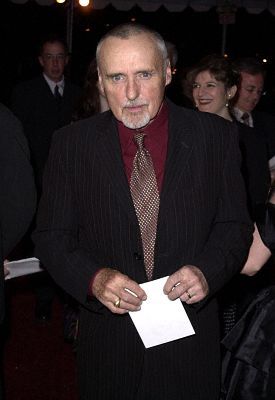|
Dennis Hopper
Scroll down for movie list.
Spouse
Victoria Duffy (4 December 1995 - present)
Katherine La Nasa (1989 - 1992); 1 son
Daria Halprin (1972 - 1976); 1 daughter
Michelle Phillips (I) (1970 - 1970)
Brooke Hayward (1961 - 1969); 1 daughter
------------------------------------------------------------------------
Trivia
His 1970 marriage to Michelle Phillips (I) lasted just a few days, during his wild and woolly, drug-fueled period. She also appears briefly in Last Movie, The (1971), Hopper's almost-disastrously appropriately entitled solo directorial effort, following Easy Rider (1969). At one point in this era, Hopper was arrested after he was found raving, naked, After early success as a child star in theater, his movie career was practically stillborn when Louis B. Mayer banned him from the MGMlot after Hopper responded forcefully, in kind, when the mogul belittled his desire to play Shakespearen roles.
His house in Venice Beach, LA is a radical architectural statement
(October 1997) Ranked #87 in Empire (UK) magazine's "The Top 100 Movie Stars of All Time" list.
(14 March 1997) Reported that Rip Torn has won a $475,000 defamation suit against Hopper. Lawsuit came about after remarks made by Hopper on the Tonight Show on 31 May 1994.
Dennis Hopper married Victoria Cane Duffy in Boston, at the Old South Church.
Was arrested in July 1975, charged of reckless driving, failure to report an accident, leaving the scene of an accident, evading police officers.
Belongs to the Top 100 collectors of modern art.
Had his photography exhibited at Fort Worth, Denver, Wichita, Cochran, and Spileto art museuems, as well as the Parco Gallery, and in the cities of Tokyo, Osaka, and Kumatomo, Japan.
As a youngster in Kansas City, he took classes taught by legendary painter Thomas Hart Benton, who told him: "One day you'll learn to get tight, and paint loose."
At one time, was blackballed from Hollywood roles for eight years.
1 September 2000 - A Canadian judge dismissed marijuana charges against Hopper stemming from an October 1999 arrest in Calgary.
------------------------------------------------------------------------
Biography from Leonard Maltin's Movie Encyclopedia:
"Don't you f-in' look at me!" With those words, Dennis Hopper, whose mainstream career had floundered throughout the 1970s and early 1980s, was reborn as the apotheosis of middle-American menace. The movie was David Lynch's celebrated 1986 thriller Blue Velvet and while his terrifying performance as villain Frank Booth did perhaps lead to a few too many subsequent psycho roles, it announced the fullfledged comeback of an artist whose full talents were often ill-utilized (by both himself and others) the first time around. As a young man in the 1950s, he played a series of minor roles, twice in movies featuring James Dean (1955's Rebel Without a Cause and 1956's Giant a friend Hopper regarded as a mentor. Graduating to supporting roles and guest-star slots in TV dramas in the 1960s, the method actor was soon pegged as "difficult." He began working in Roger Corman productions; in 1967 he appeared in Corman's acid spectacular The Trip
Offscreen Hopper was an active part of the pop art explosion of the era, both as a savvy and appreciative collector and a photographic chronicler of the "scene"; recent books and exhibitions of his pictures show him to be a fine photographer who had some fascinating subjects to work with. In 1969 he directed, cowrote, and starred in Easy Rider the ultimate counterculture movie that was a boxoffice and critical sensation. (The script was Oscar-nominated.) Flush with its success, he went on to direct the daring, selfreflexive, and willful The Last Movie (1971), the crushing failure of which alienated him from the Hollywood establishment. His screen appearances from that point on were varied and desultory; by his account, he was wandering in a morass of drugs and drink throughout the 1970s. He seemed totally spaced-out in Francis Coppola's 1979Apocalypse Now but he was capable of doing some solid work in that state, as witness his affecting, layered performance in Wim Wenders'The American Friend (1977).
After spending the early 1980s getting himself cleaned up, he auditioned for Blue Velvet by telephoning Lynch and telling him "I am Frank Booth." He has worked steadily since, both as actor (playing a wide variety of roles, including an Oscarnominated turn as a town drunk in 1986's Hoosiers and a burned-out ex-hippie in 1990's Flashback and a director (showing a solid command of mainstream movie making in 1988's Colors and an arresting command of visual style and a wry appreciation of noir irony in the genuinely erotic thriller The Hot Spot 1990). More recently Hopper won kudos for his superb starring turn in Paris Trout (1991) and had the distinction of being the most normal character to appear on screen in True Romance (1993), as Christian Slater's father. |  |










